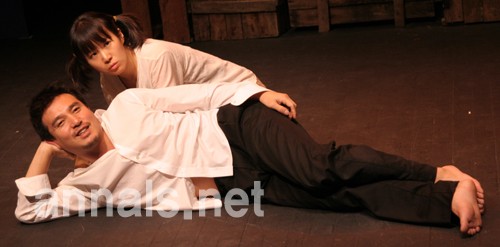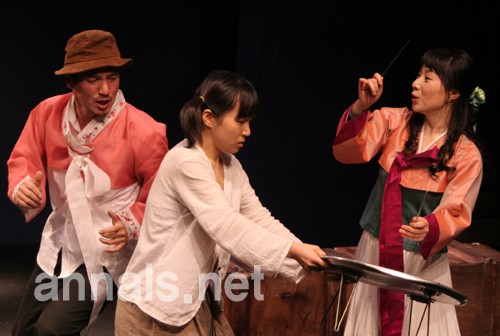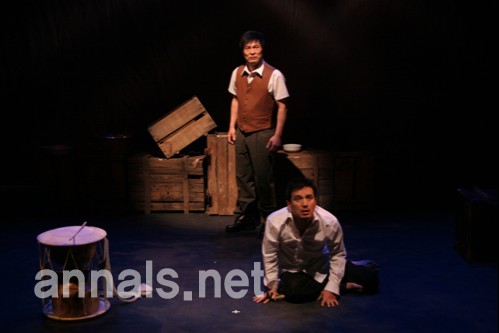An anecdote of a parent reflecting back upon views of our fathers
WHEN DID you last have a heart-to-heart talk with your father? We are apt to be indifferent to the past heroes of our childhood. Hearing the word “father,” you will probably imagine the traditional feature of a “strong” father or think of your obstinate “old man.” Yet have you ever tried to discover who your father really is?

Shouting to people’s hearts
The play Kyung-suk and Kyung-suk’s Father illustrates the life of a Korean family amidst the country’s most turbulent period, the ’50s. As well as depicting the family’s wading through difficulties such as the Korean War, the play also distinguishes itself with its unconventional approach to the concept of “father,” which is quite distant from the image of a grave and stern father that people usually expect. In spite of the character’s weirdness, the play arouses deep compassion from the audience; while other characters or the background itself also appeals to the audience’s minds. “Most people could find the story familiar to some extent, which helps them to quickly feel comfortable with the play,” comments Park Keun-hyung, the Director. Such sympathy from the audience endorsed Kyung-suk and Kyung-suk’s Father the honor of earning numerous prizes, such as “Arts Award of the Year(2006)” and “Daesan Literary Awards,” as soon as this excellent play was first performed in 2006. For this year’s encore performance, the play reinforces itself with new performers, including some renowned actors like Cho Jae-hyun and Lee Han-wi.
A father who is odd but lovable
Throughout the performance, the life of Kyung-suk’s father is presented from the perspective of Kyung-suk. The father appears to be selfish, shallow and even lacking the sense of responsibility. The Korean War occurs during the early scenes of the play and he runs away without his family. Instead, he commands them to “protect the house.” When he returned home after the war, he frustrates the family’s hope to live together and sets out again, since, according to his words, “It’s a vagabond life.” Moreover, he brings home his new lover Ja-ya; when Ja-ya leaves him, the childish husband behaves foolishly, exhorting his wife to go and persuade Ja-ya on behalf of him. Seeing the self-centered behavior of her father, Kyung-suk distrusts him so far as in her dreams; she dreamt that when she was turned into a mackerel, her father ate her.
Nevertheless, the audience can also discover his noble aspects if they look carefully, for some of his actions reveal his hidden affection toward his family. One of the most moving scenes occurs when, at Kyung-suk’s college graduation ceremony, the father brings her a pair of shoes, saying “You’ll need shoes to take a first step into the real world.” For him, wearing shoes means facing one’s life on his or her own, as Kyung-suk’s grandfather gave shoes to his son, encouraging him to go and live his life. The father passes on the same encouragement to his daughter, Kyung-suk. Throughout this scene, the audience can sense the clumsy expression of love through the heartfelt expression of a detached father.

What Kyung-suk’s father tells us
Kyung-suk and Kyung-suk’s Father is full of “unrealistic” acts of the father, which ironically make us look back on our realities in life. Free from our society’s “ideal stereotype” of a father, the audience, especially fathers, can identify their own true and honest selves through the life and experiences of this seemingly “odd” parent. For example, the father follows the liberal life he dreamt about in his “salad” days. During the outbreak of the Korean War, he abandons his family but takes his precious janggu* which represents a “free life.” Such an excessive pursuit of dreams speaks strongly that our fathers, too, had their youthful desires, which had to be sacrificed to the grim reality of a hard and cruel world.
In addition, Kyung-suk’s father drifts throughout his entire life and remains a family outsider until the very end; this extreme alienation stresses the solitude fathers experience these days. People may think that he is lonely because he is a strange wanderer – so different from our ordinary fathers. Yet, in fact, Kyung-suk’s father reflects none other than the lonely reflections of fathers near us; although they are with us in a physical way, they still remain as foreigners in an emotional sense. Park recalls his lack of conversation with his father. “I rarely had deep talks with my father. I came to know his life only through other family members.” As such, our solitary fathers more than likely most resemble Kyung-suk’s father.

Impactive but not one- sided
The play is well-balanced, both in its overall mood and the weight of each character. As the audience gets a glimpse into the dark facets of the most disordered epochs of Korea - war, poverty, violence and deep-rooted convention of patriarchy – and as the play portrays the solitude of a father, the atmosphere might have become too serious. Still, the play is not heavy at all, since such danger was well-disguised by its bright sense of humor, which can also be defined as haehak, the Korean spirit of turning agony into laughter. Besides, chances were that the whole play revolves around only the main character, since the storyline focuses on Kyung-suk’s father as portrayed by the actor Cho Jae-hyun, who is famous with his charismatic acting. Despite such a possibility, the other characters of Kyung-suk and Kyung-suk’s father effectively exhibit their own colors. Particularly, the mother (Goh Su-hee) and Kyung-suk (Joo In-young) overwhelm the audience with their vivid acting. These characters effectively deliver the message of reconciliation based on love and people’s overcoming the wounds of those harsh days, which is expressed in the eccentric but peaceful cohabitation of a husband, a wife, a daughter, a stranger named Kkuk-kkuk and a mistress, Ja-ya.
* * *
After seeing the play, Nahm Hyun-ji, a university student, said “I realized that her father, too, has lived his own generation.” Indeed, our fathers have undergone brutal lives; and though not successful, nor ideal, all of them have stood their ground. “True trees are nameless. Though they are ugly, they have a calming aroma…. They grow on their own, but all of them become nice after all is said and done. Those are true trees,” recites Kyung-suk’s father in the play. Probably all fathers are like “trees,” not splendid but with a good scent. Now is the time to appreciate them as they are.
| Title: Kyung-suk and Kyung-suk's Father |
| Where: Dongsoong Art Center |
| When: Jan. 25 ~ March 25 |
| Ticket Price: ₩15,000 (Students) |
*janggu: Korean traditional drum shaped like an hourglass

